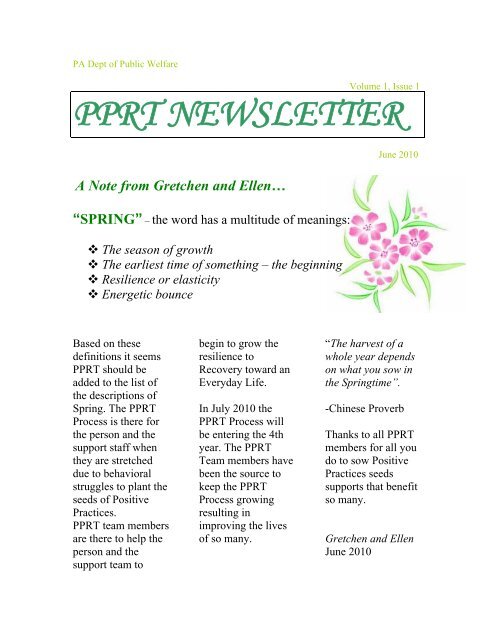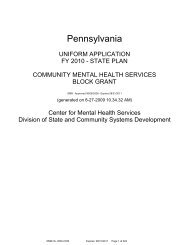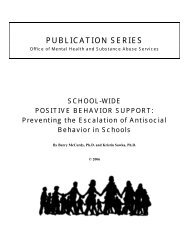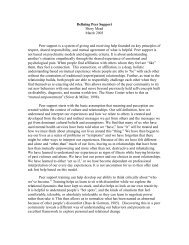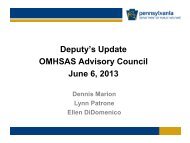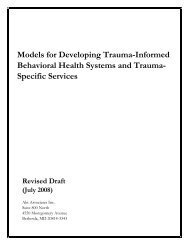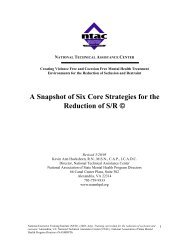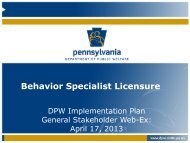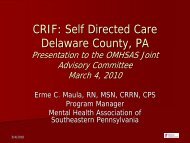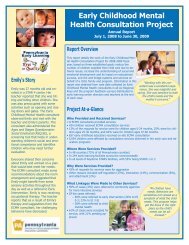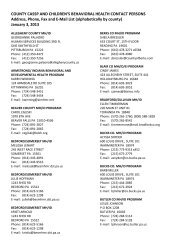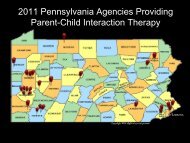PA Dept of Public Welfare - Pennsylvania Recovery and Resiliency
PA Dept of Public Welfare - Pennsylvania Recovery and Resiliency
PA Dept of Public Welfare - Pennsylvania Recovery and Resiliency
Create successful ePaper yourself
Turn your PDF publications into a flip-book with our unique Google optimized e-Paper software.
<strong>PA</strong> <strong>Dept</strong> <strong>of</strong> <strong>Public</strong> <strong>Welfare</strong><br />
Volume 1, Issue 1<br />
PPRT NEWSLETTER<br />
A Note from Gretchen <strong>and</strong> Ellen…<br />
“SPRING” – the word has a multitude <strong>of</strong> meanings:<br />
The season <strong>of</strong> growth<br />
The earliest time <strong>of</strong> something – the beginning<br />
Resilience or elasticity<br />
Energetic bounce<br />
June 2010<br />
Based on these<br />
definitions it seems<br />
PPRT should be<br />
added to the list <strong>of</strong><br />
the descriptions <strong>of</strong><br />
Spring. The PPRT<br />
Process is there for<br />
the person <strong>and</strong> the<br />
support staff when<br />
they are stretched<br />
due to behavioral<br />
struggles to plant the<br />
seeds <strong>of</strong> Positive<br />
Practices.<br />
PPRT team members<br />
are there to help the<br />
person <strong>and</strong> the<br />
support team to<br />
begin to grow the<br />
resilience to<br />
<strong>Recovery</strong> toward an<br />
Everyday Life.<br />
In July 2010 the<br />
PPRT Process will<br />
be entering the 4th<br />
year. The PPRT<br />
Team members have<br />
been the source to<br />
keep the PPRT<br />
Process growing<br />
resulting in<br />
improving the lives<br />
<strong>of</strong> so many.<br />
“The harvest <strong>of</strong> a<br />
whole year depends<br />
on what you sow in<br />
the Springtime”.<br />
-Chinese Proverb<br />
Thanks to all PPRT<br />
members for all you<br />
do to sow Positive<br />
Practices seeds<br />
supports that benefit<br />
so many.<br />
Gretchen <strong>and</strong> Ellen<br />
June 2010
Supporting People who have Problematic Sexual<br />
behavior, their families <strong>and</strong> their teams…<br />
Working with people who have intellectual disabilities <strong>and</strong> their families <strong>and</strong><br />
staff is a rewarding <strong>and</strong> fascinating experience. My role as sexuality<br />
consultant gives me the opportunity to work with a wide range <strong>of</strong> people on<br />
a topic that is a difficult one to discuss – sex. Most <strong>of</strong> us grew up with little<br />
or no discussions about healthy sexuality. Some <strong>of</strong> us were fortunate enough<br />
to have had parents who gave us accurate positive information, some <strong>of</strong> us<br />
had good sex education classes <strong>and</strong> some <strong>of</strong> us grew up on farms <strong>and</strong> saw<br />
first h<strong>and</strong> the cycle <strong>of</strong> life. Unfortunately, there are also some <strong>of</strong> us who<br />
learned about sexuality through abuse or by witnessing sexual activity we<br />
were too young to process. For the people we support, more than 90% have<br />
‘learned’ about sex through their victimization. (Sobsey & Varnhagen, 1989)<br />
<strong>and</strong> 49% will experience ten or more abusive incidents (Valenti-Hein &<br />
Schwartz, 1995)<br />
When I am contacted by the PPRT or by an agency, there is already a sexual<br />
issue. It is my job to help people figure out the ‘whys’ <strong>of</strong> particular<br />
behaviors <strong>and</strong> to learn some concrete skills. I also work with staff <strong>and</strong><br />
families to look at their own attitudes <strong>and</strong> beliefs that may be contributing to<br />
the problem.<br />
It is not unusual for me to receive a call from a program supervisor saying<br />
“We have a man who is ‘acting out’ sexually <strong>and</strong> we have no idea what to<br />
do –can you help us?” First, I think the person making the request is very<br />
brave <strong>and</strong> second, the agency clearly has a commitment to help the person<br />
they are supporting.<br />
My process goes like this: I ask that the person who knows the individual<br />
best to answer some preliminary questions on the phone or through email<br />
before I meet with them in person. One <strong>of</strong> the questions I always ask is<br />
“Does the person masturbate, <strong>and</strong> if so, do you happen to know what fantasy<br />
they use”? The reason I ask this is to determine if the person is focusing on<br />
children or non-consenting adults, is there violence or are they being hurt in<br />
the fantasy. I also ask about early childhood abuse or trauma. These two<br />
areas are the basis for the questions I will use in discussions with staff,<br />
family <strong>and</strong> the individual.
We set a date for me to do two things. First, in the morning, I will meet with<br />
staff <strong>and</strong>/or family –together or sequentially. During that meeting I ask about<br />
specific behaviors, comments –anything they feel is a problem, including<br />
how he/or she interacts with them. Is there a particular person/s that they do<br />
or don’t get along with or do they act out more in the day program, at home<br />
or when visiting or returning from family visits?<br />
In the afternoon, I meet with the individual <strong>and</strong> I begin by telling them my<br />
name <strong>and</strong> that “I know a lot about sex <strong>and</strong> our bodies. You can ask or tell me<br />
anything <strong>and</strong> I will not get angry <strong>and</strong> I will try my best to answer your<br />
questions. You do not have to talk to me at all, but I want to help you, so I<br />
hope that you will talk to me” Then I ask the person to tell me what I just<br />
said so that I am sure they underst<strong>and</strong>. Usually the response is something<br />
like “You know about sex <strong>and</strong> I can ask you anything”. I tell them that is<br />
correct <strong>and</strong> we begin.<br />
Based on the phone interview <strong>and</strong> the morning meeting, I have prepared a<br />
series <strong>of</strong> questions related to the current problems as well as basic<br />
knowledge <strong>of</strong> their body, the correct names <strong>and</strong> functions <strong>of</strong> specific body<br />
‘parts’. I also use the Verbal Informed Sexual Consent Assessment Tool<br />
(VISCAT). This tool is primarily used to determine if an individual has the<br />
ability to give consent for sexual activity. I also use it to determine the<br />
individual’s knowledge <strong>of</strong> public/private, peer pressure, safe sex <strong>and</strong> the<br />
law. At the end <strong>of</strong> the interview I ask the person if they have any questions<br />
for me. They usually do.<br />
I would like to give a few examples <strong>of</strong> questions that I have been asked by<br />
people who have intellectual disabilities. The words in italics are some <strong>of</strong> my<br />
responses.<br />
• How are men <strong>and</strong> women different – down there?<br />
• Exactly how do people make babies?<br />
• How do babies get out?<br />
• What is an episiotomy?<br />
• What is a yeast infection?<br />
• How do you get a bladder infection?<br />
• What does ‘period’ mean?<br />
• If I get a girlfriend, what do I do other than have sex?<br />
• Is it wrong to masturbate if you are a Christian?
• Are you single? I answer “Yes”. “But it would be wrong to kiss you,<br />
right? “Yes, now let’s talk about why that would be wrong”<br />
• “Is it wrong for a man to be with a man?” “No” “Is it wrong for a<br />
woman to be with a woman” “No” “Is it wrong for a black person to<br />
be with a white person?” “No”.<br />
In addition to the actual person who is having problems, there are all the<br />
people around him or her <strong>and</strong> in all honestly, they may be part <strong>of</strong> the<br />
problem For example, if a team is culturally diverse, it is important to<br />
discuss how each <strong>of</strong> those cultures view sexual issues (i.e. masturbation,<br />
same sex relationships, sex before marriage). It is equally important to help<br />
staff become comfortable discussing sex or sexual activity. If a person has a<br />
question, it should be answered simply <strong>and</strong> accurately <strong>and</strong> immediately. It is<br />
never appropriate to respond to a question by saying “I can not answer that –<br />
you should ask your therapist next week”. The moment is done <strong>and</strong> an<br />
opportunity is missed.<br />
I enjoy working with staff to help them become a bit more comfortable with<br />
sexuality. I have as series <strong>of</strong> activities that are educational <strong>and</strong> fun that I<br />
hope have helped exp<strong>and</strong> attitudes <strong>and</strong> break down walls <strong>of</strong> discomfort. I am<br />
convinced that not everyone can work with people who have problematic<br />
sexual behaviors or those who are sexual <strong>of</strong>fenders. Often there are valid<br />
reasons (i.e. personal or family history <strong>of</strong> abuse, religion or cultural beliefs)<br />
that make it difficult to be supportive <strong>of</strong> people you may perceive to be<br />
“bad’. If you can not separate the person from the behavior <strong>and</strong> treat them<br />
with respect, you should not be working with this population. You will do<br />
more harm than good.<br />
In summary, I consider myself fortunate to have worked with people who<br />
struggle with sexual issues <strong>and</strong> who are learning to change their behaviors,<br />
the families who make the journey with them <strong>and</strong> the provider agencies that<br />
continue to provide a safe place in which to help people learn <strong>and</strong> grow <strong>and</strong><br />
have an Everyday Life.<br />
Sharon Mahar Potter M.Ed.<br />
Sexuality Consultant, Office <strong>of</strong> Developmental Programs
A True Success Story<br />
Or<br />
Why We Do What We Do<br />
By<br />
Melanie Liddie<br />
And<br />
Amber Baldensperger<br />
<strong>PA</strong>RT ONE by Melanie Liddie, Psychologist WSH<br />
One day just over a year ago in April <strong>of</strong> 2009, I was asked to participate in a very<br />
unique PPRT. I was told that there was a man named Dave (name has been changed) with<br />
an MR/MH diagnosis; he had gotten into some legal difficulties <strong>and</strong> had been sent to a<br />
State Prison. The problem was he was doing very poorly there <strong>and</strong> seemed to be<br />
misplaced. He was in a small cell where he was incontinent <strong>and</strong> <strong>of</strong>ten would smear his<br />
feces on the walls <strong>and</strong> the floor. He rarely said a word to anyone. To say the least he was<br />
not responding well to his incarceration.<br />
So I agreed to go for a visit to meet this man <strong>and</strong> learn more about him. I prepared<br />
a nice list <strong>of</strong> questions which I thought might get him talking, drove to the Prison where I<br />
met with John O’Connor; Christine Bayuk, <strong>and</strong> Doug Pickens. We had lunch <strong>and</strong> then<br />
went to the State Prison. What I was about to witness, I was not prepared for. We were<br />
escorted through a noisy area that had 2 stories <strong>and</strong> high ceilings, almost like a<br />
gymnasium which echoed badly. We sat in a small room <strong>and</strong> Dave was escorted in<br />
shackles by 2 CO’s. He was placed in a small cell that looked like a cage <strong>and</strong> asked to sit<br />
on the metal bench that was attached to the back wall. We sat outside on plastic chairs<br />
ready to interview him. Dave was much disheveled with long matted hair <strong>and</strong> beard, a<br />
prison jumpsuit, <strong>and</strong> urine soaked socks. We were told that while Dave was with us they<br />
would hose out his cell in an effort in order to get rid <strong>of</strong> the urine <strong>and</strong> feces.<br />
We introduced ourselves <strong>and</strong> I then asked Dave one <strong>of</strong> my nicely prepared<br />
questions…no answer…just an intent, vacant, desperate kind <strong>of</strong> look. He scanned the<br />
environment constantly <strong>and</strong> seemed quite alert <strong>and</strong> aware <strong>of</strong> the strange visitors talking at<br />
him. He mumbled only a couple <strong>of</strong> s<strong>of</strong>t responses throughout the entire 20 minute time<br />
we shared. Doug told him that we were starting the process to get him out <strong>of</strong> Prison; he<br />
looked interested but remained basically unresponsive. We all left somewhat shaken by<br />
this experience I think, imagining the existence this man was living. It was hard to leave,<br />
because no one would have wanted him to be in that condition for even another day. We<br />
were also very determined that something needed to happen as soon as possible.<br />
The PPRT meetings continued via teleconference <strong>and</strong> some others went to visit<br />
Dave as well. He was released through probation <strong>and</strong> came to Warren State Hospital on<br />
August 10, 2009. He was out <strong>of</strong> the State Prison finally <strong>and</strong> on to a whole new<br />
experience. I will let his excellent Social Worker, Amber Baldensperger; tell the rest <strong>of</strong><br />
this man’s incredible story.
<strong>PA</strong>RT TWO by Amber Baldensperger, Social Worker<br />
Dave arrived at the hospital in a prison issued orange jumpsuit. He came with<br />
nothing. The Correction Officers unlocked his shackles, waited for the uniform, <strong>and</strong> were<br />
quickly on their way. We headed up to Dave’s unit where he would spend the next 7<br />
months.<br />
Dave was not speaking words, but you could feel his anxiety. He was introduced<br />
to many staff from different disciplines in hopes <strong>of</strong> gaining more information <strong>and</strong> a better<br />
underst<strong>and</strong>ing <strong>of</strong> Dave. When asked a question, he would stare at you <strong>and</strong> not respond.<br />
He paced around the unit; taking it all in. A one-to-one staff was put in place to help with<br />
this huge transition. However, it wasn’t needed for long.<br />
Dave rather quickly settled into the routine <strong>of</strong> the hospital. He attended sheltered<br />
workshop, recovery center <strong>and</strong> especially enjoyed the Therapeutic Recreation activities.<br />
We were aware that Dave had the ability to speak, but he chose to talk with his peers<br />
typically close to being outside <strong>of</strong> staff earshot. Dave was slowly becoming trusting <strong>of</strong><br />
the staff <strong>and</strong> he hesitantly began speaking to the staff here.<br />
Dave’s home community stayed very involved in his care here. They would<br />
occasionally bring him clothing, music, <strong>and</strong> snacks. It was obvious that he was<br />
appreciative <strong>of</strong> the gifts, even when he wasn’t able to say it in words. We continued to<br />
have PPRT updates where we were able to share Dave’s steady progress. Throughout the<br />
course <strong>of</strong> his hospital stay, Dave’s progress amazed everyone. He began smiling more.<br />
He was able to tell people his needs. Dave began taking care <strong>of</strong> his ADL’s. He sang<br />
along with his radio <strong>and</strong> he played basketball in the gym. Dave interacted with people<br />
<strong>and</strong> made friends.<br />
In November 2009, Dave was able to meet with four residential providers. All<br />
four <strong>of</strong>fered such a wonderful community living experience for Dave. He seemed<br />
particularly comfortable with two. We went to visit the two in person. He enjoyed his day<br />
out, singing along with the radio. He was all smiles. Both residential programs were<br />
welcoming <strong>and</strong> <strong>of</strong>fered such a great opportunity for Dave. He talked about the visit all<br />
weekend <strong>and</strong> was especially one <strong>of</strong> the homes, Training towards Self Reliance. This<br />
would be where he would be discharged. Dave began visiting the TTSR home, which<br />
gave him the opportunity to get to know the other residents <strong>and</strong> staff. His communication<br />
skills continued to improve. He was enjoying his visits at TTSR preparing for his<br />
discharge. His discharge date, March 4, was set <strong>and</strong> his aftercare services were put in<br />
place.<br />
March 4, 2010 was significant day for Dave, the hospital staff, <strong>and</strong> the members<br />
<strong>of</strong> his PPRT team. We as a team worked hard for this day, but more importantly, it was<br />
Dave’s day to return to the community <strong>and</strong> to return to his life.<br />
-Thank you to the hospital staff, PPRT members, TTSR staff <strong>and</strong> Dave’s home<br />
community supports for the fantastic care, coordination, support <strong>and</strong> efforts which truly<br />
made a difference for Dave.
Regional PPRT Meetings<br />
We will be hosting our 4 th Annual PPRT meetings later this<br />
Summer <strong>and</strong> early Autumn. Check with your Supervisor to see if<br />
you can attend.<br />
Western Region<br />
Ebensburg Center<br />
10-3<br />
August 24, 2010<br />
Eastern Region<br />
(includes Central, Northeast <strong>and</strong> Southeast Region)<br />
Clarks Summit State Hospital<br />
10-3<br />
September 21, 2010<br />
We will be focusing this year on 2 specific areas, the role <strong>of</strong> the leader in the PPRT<br />
process <strong>and</strong> the pharmacological review (how to get the most out <strong>of</strong> this invaluable<br />
service)<br />
Ellen <strong>and</strong> Gretchen hope to see all <strong>of</strong> you there. In addition to the educational<br />
opportunities this is a great chance for you to re-connect with other team members.<br />
Lunch will be provided <strong>and</strong> we will again have lots <strong>of</strong> prizes <strong>and</strong> surprises.<br />
Hope to see you there!
THANK YOU!<br />
Office <strong>of</strong> Developmental Programs PPRT Members:<br />
• Patricia McCool, Acting ODP Director/Bureau <strong>of</strong> Supports for<br />
People with Intellectual Disabilities<br />
• Pamela Kuhno, Director <strong>of</strong> ICF/MR Program Operations<br />
• Angela Fortney, Acting Director <strong>of</strong> Division <strong>of</strong> Community Programs/Services<br />
• Dr. Jill Morrow-Gorton, Clinical Director Medical Services<br />
• Dr. Amy Nemirow, Clinical Director/Behavioral Health Services<br />
• Laurie Dutz, Non-State ICF/MR Agency PPRT contact<br />
• Ellen Wagner, ODP PPRT Lead<br />
Ebensburg Center (Marlinda Smith, Facility Director):<br />
Bednar, Monica Speech/Language<br />
Specialist<br />
Frye, Mary<br />
Occupational Therapist<br />
Fodor, April<br />
QMRP<br />
Fulton, Karen<br />
Dietician<br />
Hammond, Neal Volunteer Resource<br />
Coordinator<br />
Johnson, Danna Pharmacist<br />
Kleman, Elwood QMRP<br />
(Woody)<br />
Labriola, Margaret Program Worker<br />
Meyers, Erin<br />
QMRP<br />
Muriceak, Andrea Registered Nurse<br />
Noel, Mary<br />
QMRP<br />
Phillips, John<br />
Psychologist<br />
Seese, Ray<br />
Registered Nurse<br />
Smith, Kelly<br />
MR Services Worker<br />
Swank, Brian<br />
Pharmacist<br />
Tremel, John Q. Physical Therapist<br />
Waddell, Betty MR Manager/RN
Hamburg Center (Edward G. Siminitus, Facility Director:<br />
Andracchio, Ann Marie Social Worker<br />
Boyer, Ann<br />
Deisenroth, Tom<br />
Donahue, Donna<br />
Geirsson, Michael<br />
Hartman, Denise<br />
Hoy, Gary<br />
Kline, S<strong>and</strong>y<br />
Oparanozie, Edmund<br />
Yoe, Marileen<br />
QMRP<br />
MR Services<br />
Support Worker<br />
QMRP<br />
Psychologist<br />
MR Services Support<br />
Worker<br />
MR Services<br />
Support Manager<br />
Registered<br />
Nurse Manager<br />
Psychologist<br />
MR Services Worker<br />
Polk Center (Shirley Pickens, Facility Director):<br />
Baker, Patty<br />
Crawford, Charles<br />
Dickson, Kathy<br />
Guilinger, Braden<br />
Hawkins, Karen<br />
Hicks, Tonya<br />
Kirkpatrick,<br />
Sheridan (Herk)<br />
Lovejoy, Mary<br />
McDonough, Vickie<br />
Polachek, Nancy<br />
Becky Piccolin<br />
Truesdell, Judy<br />
Truesdell, Rick<br />
Winger, Ed<br />
Therapeutic Worker<br />
MR Services Worker<br />
Licensed Practical Nurse<br />
Direct Support Staff<br />
MR Services Worker<br />
Direct Support Staff<br />
Licensed Psychologist<br />
Direct Support Staff<br />
Licensed Psychologist<br />
Speech/Language<br />
Therapist<br />
MR Services Manager<br />
Psychologist<br />
Direct Support Staff<br />
Program Services Director
Selinsgrove Center (Kevin E. Dressler, Facility Director):<br />
Barnes, Pat<br />
Therapeutic Services Worker<br />
Carr, Tina<br />
Staff Development Specialist<br />
Cooper, Doug MR Services Worker<br />
Dlabik, Kathy Speech/Language Specialist<br />
Dressler, Thelma Direct Support Aide<br />
Dubosky, Sue Speech/Language Specialist<br />
English, Todd QMRP<br />
Fickes, John<br />
Psychologist<br />
Frederick, Amy QI Specialist<br />
Gallik, Steve Occupational Therapist<br />
Gaugler, Marv MR Services Worker<br />
Goundie, Donna Licensed Occupational Therapist<br />
Hackenberg, Deb Social Worker<br />
Hall, Shelly<br />
Registered Nurse<br />
Heckman, Mike QMRP<br />
Hickey, Bill<br />
Psychologist/Therapeutic<br />
Services Director<br />
Johnson, Emily Licensed Physical Therapist<br />
Kauffman, Paul Chaplain<br />
Knepp, Krystal Social Worker<br />
Lebo, Chuck<br />
Licensed Physical Therapist<br />
Marino, Julian MR Services Worker<br />
McCormick, Jim Pharmacist Chief<br />
Oburn, Justine QMRP<br />
Osborne, Tim MR Services Support Worker<br />
Rozinski, Cheri MR Services Supervisor<br />
Scheeler, Dave Registered Nurse<br />
Schuhl, Mary MR Services Manager<br />
Shopinski, Virginia MR Direct Support Pr<strong>of</strong>essional<br />
Simeon<strong>of</strong>f, Daphne QMRP<br />
Stumpf, John Psychologist<br />
Sturm, Deborah Psychologist<br />
Tedesco, Danielle Psychologist<br />
Willard, Shirley Health Services Director<br />
Williams, Elizabeth Registered Nurse<br />
Worthy, S<strong>and</strong>y Registered Nurse
White Haven Center (Fred Lokuta, Facility Director):<br />
Bartosiewicz, Sharon Speech/Hearing Specialist<br />
Delorenzo, Angelo MR Services Worker<br />
Dodson, Bruce QMRP<br />
Georgetti, Mark MR Services Manager<br />
Gola, Tammy Registered Nurse<br />
Howey, John QMRP<br />
Kells, Jim<br />
MR Services Manager<br />
Kvedrowicz, Am<strong>and</strong>a MR Services Worker<br />
Lokuta, Michael Social Worker<br />
Shields, Danielle MR Direct Support<br />
White, Brenda Staff Development Specialist<br />
Youngcourt, Colleen QMRP<br />
ODP Regional Field Offices<br />
Central Region:<br />
John Witt, Program Manager<br />
Adam Furfari, PPRT Lead<br />
Northeast Region:<br />
Bob Conklin, Program Manager<br />
Michele O’Toole, PPRT Lead<br />
Southeast Region:<br />
Vicki Stillman-Toomey, Program Manager<br />
Kathy Gerrity, PPRT Lead<br />
Western Region:<br />
S<strong>and</strong>y Schalcosky, Program Manager<br />
Christine Bayuk, PPRT Lead
Office <strong>of</strong> Mental Health <strong>and</strong> Substance Abuse Services PPRT Members:<br />
Donna Ashbridge, Acting Director, Bureau <strong>of</strong> Community <strong>and</strong> Hospital Operations<br />
Julie Barley, Acting Chief, Division <strong>of</strong> Eastern Operations<br />
Linda Zelch, Chief, Division <strong>of</strong> Western Operations<br />
Gretchen Hathaway, PPRT Lead OMHSAS<br />
Allentown State Hospital<br />
Mary Jeanne Serafin, CEO<br />
Dr. Kishorkumar Dedania<br />
Dr. William Schneller<br />
Dr. Alex Thomas<br />
Karen Wolfe<br />
Psychiatrist<br />
Psychologist<br />
Psychiatrist<br />
CNE<br />
Clarks Summit State Hospital<br />
Tom Comerford, CEO<br />
Dr. Alan Benson<br />
Bill Callejas<br />
Jerry Fabricatore<br />
Lisa Gardier<br />
Dr. Larry Gehres<br />
Jeff Hubert<br />
Barbara Jones<br />
Sharon Korba<br />
Shelly Lebenson-Wharton<br />
Dr. Anthony Pagnotti<br />
Karen Savage<br />
Leslie Swantek<br />
Courtney Lancia<br />
Psychologist<br />
Registered Nurse<br />
Social Worker<br />
Registered Nurse<br />
Psychologist/CSRE<br />
Registered Pharmacist<br />
Therapeutic Recreation Service Worker<br />
VAS Manager<br />
Psychologist<br />
Psychologist<br />
Registered Nurse<br />
Psychologist<br />
Occupational Therapist<br />
Danville State Hospital<br />
Linda Lesher, Acting CEO<br />
Lisa Ard<br />
Mary Beth Brady<br />
Stacey Gerber<br />
Guidyne Little<br />
Matt Krolikowski<br />
Abby Miller<br />
Registered Nurse<br />
Occupational Therapist<br />
Psychiatric Aide<br />
Social Worker<br />
Registered Nurse<br />
LPN
Karen Schu<br />
Jean Springer<br />
Registered Dietician<br />
Therapeutic Activities Services Worker<br />
Norristown State Hospital<br />
Gerry Kent, CEO<br />
Traci Canon<br />
Joe Grayeske<br />
Christine Jeffers<br />
Adlai Joseph<br />
Angie Yeager<br />
Registered Nurse<br />
Psychiatric Clinical Nurse Specialist<br />
Registered Nurse<br />
Registered Pharmacist<br />
Registered Nurse<br />
South Mountain Restoration Center<br />
S<strong>and</strong>ra Knoble, CEO<br />
Donna Harrison<br />
Adam Campbell<br />
Registered Nurse<br />
Social Worker<br />
State Operated Services, Pittsburgh<br />
Kathryn Thomas, CNE<br />
Ray Fryer<br />
Maureen McHugh<br />
Helene McQuillan<br />
Dani Scears<br />
Social Worker<br />
Psychiatric Clinical Nurse Specialist<br />
Registered Nurse<br />
Registered Pharmacist<br />
Torrance State Hospital<br />
Edna McCutcheon, CEO<br />
Patty C<strong>of</strong>fman<br />
Dr. Safdar Chaudhary<br />
Dona Curti<br />
David Dahlheimer<br />
Barry Farabaugh<br />
Dr. Brent Ednie<br />
Roxanne Grimm<br />
Sally Harris<br />
Karyn Harshbarger<br />
Roberta Lawrence<br />
Kenneth Main<br />
Bev Marsh<br />
Registered Nurse<br />
Psychiatrist<br />
Registered Pharmacist<br />
Psychologist<br />
Social Worker<br />
Physician<br />
Registered Nurse<br />
Social Worker<br />
Registered Pharmacist<br />
Social Worker<br />
Security Officer<br />
Registered Nurse
George Maser<br />
Stacey McCreary<br />
Martin McKee<br />
Thomas Pipak<br />
Social Worker<br />
Social Worker<br />
Therapeutic Activities Services Worker<br />
Social Worker<br />
STRP<br />
Vita Dongiovanni, Director<br />
George Barbour<br />
Social Worker<br />
Warren State Hospital<br />
Charlotte Uber, CEO<br />
Bonnie Abplanalp<br />
Amber Baldensperger<br />
Herb Barnickel<br />
William Bussoletti<br />
Kristen Darling<br />
Don Krasa<br />
Melanie Liddie<br />
Dr. Hridayesh Pathak<br />
Cheryl Riche<br />
Dr. Promila Sood<br />
Social Worker<br />
Social Worker<br />
Drug <strong>and</strong> Alcohol Treatment Specialist<br />
Risk Manager<br />
Registered Nurse<br />
Registered Nurse<br />
Psychologist<br />
Psychiatrist<br />
Psychologist<br />
Psychiatrist<br />
Wernersville State Hospital<br />
Andrea Kepler, CEO<br />
Dr. Dale Adair<br />
John Bingaman<br />
Tami Beltz<br />
Frank Botto<br />
Ernie DeAngelis<br />
Scott Kirkpatrick<br />
Marilyn Leslie<br />
Le Ann Rynier<br />
Dr. Mary Thompson<br />
Dr. Emilia Vitolo-Gallo<br />
Sara We<strong>and</strong><br />
Psychiatrist<br />
Psychologist<br />
Registered Nurse<br />
VAS Manager<br />
Social Worker<br />
Registered Pharmacist<br />
Therapeutic Activities Services Supervisor<br />
Psychiatric Clinical Nurse Specialist<br />
Psychologist<br />
Psychiatrist<br />
Social Worker
OMHSAS Bureau <strong>of</strong> Quality <strong>and</strong> Systems Management<br />
Clinical Review<br />
Trisha Mader, Director<br />
Rhonda Harris, Supervisor<br />
Michelle Weidner, Supervisor<br />
Sue Allen<br />
Dipa Mookerjee<br />
Kathy Mortenson<br />
Steve Murdock<br />
Registered Nurse<br />
Registered Nurse<br />
Registered Nurse<br />
Registered Nurse<br />
OMHSAS Headquarters<br />
Marilyn Linko<br />
Valerie Minnich<br />
Registered Nurse<br />
Registered Pharmacist<br />
Central Region Field Office<br />
Kellie Wayda, Acting Community Program Manager<br />
Greg Crosson<br />
Marie Maurice<br />
Dawn Ritter<br />
Northeast Region Field Office<br />
Tim Little<br />
Southeast Region Field Office<br />
Thomasina Bouknight, Community Program Manager<br />
Scott Anstey<br />
Western Region Field Office<br />
Ray Jaquette, Acting Community Program Manager<br />
John O’Connor


